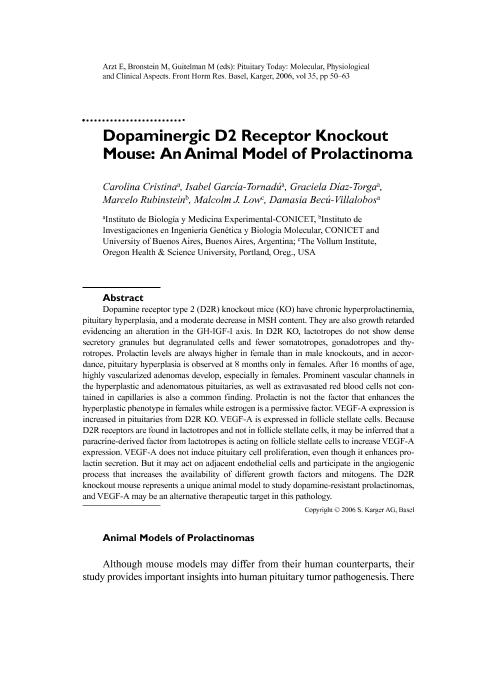Artículo
Dopaminergic D2 receptor knockout mouse: an animal model of prolactinoma
Cristina, Silvia Carolina ; Garcia Tornadu, Isabel Andrea
; Garcia Tornadu, Isabel Andrea ; Diaz, Graciela Susana
; Diaz, Graciela Susana ; Rubinstein, Marcelo
; Rubinstein, Marcelo ; Low, M.; Becu, Damasia
; Low, M.; Becu, Damasia
 ; Garcia Tornadu, Isabel Andrea
; Garcia Tornadu, Isabel Andrea ; Diaz, Graciela Susana
; Diaz, Graciela Susana ; Rubinstein, Marcelo
; Rubinstein, Marcelo ; Low, M.; Becu, Damasia
; Low, M.; Becu, Damasia
Fecha de publicación:
2006
Editorial:
Karger
Revista:
Frontiers of Hormone Research
ISSN:
0301-3073
e-ISSN:
1662-3762
Idioma:
Inglés
Tipo de recurso:
Artículo publicado
Clasificación temática:
Resumen
Dopamine receptor type 2 (D2R) knockout mice (KO) have chronic hyperprolactinemia, pituitary hyperplasia, and a moderate decrease in MSH content. They are also growth retarded evidencing an alteration in the GH-IGF-I axis. In D2R KO, lactotropes do not show dense secretory granules but degranulated cells and fewer somatotropes, gonadotropes and thyrotropes. Prolactin levels are always higher in female than in male knockouts, and in accordance, pituitary hyperplasia is observed at 8 months only in females. After 16 months of age, highly vascularized adenomas develop, especially in females. Prominent vascular channels in the hyperplastic and adenomatous pituitaries, as well as extravasated red blood cells not contained in capillaries is also a common finding. Prolactin is not the factor that enhances the hyperplastic phenotype in females while estrogen is a permissive factor. VEGF-A expression is increased in pituitaries from D2R KO. VEGF-A is expressed in follicle stellate cells. Because D2R receptors are found in lactotropes and not in follicle stellate cells, it may be inferred that a paracrine-derived factor from lactotropes is acting on follicle stellate cells to increase VEGF-A expression. VEGF-A does not induce pituitary cell proliferation, even though it enhances prolactin secretion. But it may act on adjacent endothelial cells and participate in the angiogenic process that increases the availability of different growth factors and mitogens. The D2R knockout mouse represents a unique animal model to study dopamine-resistant prolactinomas, and VEGF-A may be an alternative therapeutic target in this pathology.
Palabras clave:
Endocrinology
,
Cancer
,
Pituitary Gland
,
Prolactinoma
Archivos asociados
Licencia
Identificadores
Colecciones
Articulos(IBYME)
Articulos de INST.DE BIOLOGIA Y MEDICINA EXPERIMENTAL (I)
Articulos de INST.DE BIOLOGIA Y MEDICINA EXPERIMENTAL (I)
Articulos(INGEBI)
Articulos de INST.DE INVEST.EN ING.GENETICA Y BIOL.MOLECULAR "DR. HECTOR N TORRES"
Articulos de INST.DE INVEST.EN ING.GENETICA Y BIOL.MOLECULAR "DR. HECTOR N TORRES"
Citación
Cristina, Silvia Carolina; Garcia Tornadu, Isabel Andrea; Diaz, Graciela Susana; Rubinstein, Marcelo; Low, M.; et al.; Dopaminergic D2 receptor knockout mouse: an animal model of prolactinoma; Karger; Frontiers of Hormone Research; 35; 2006; 50-63
Compartir
Altmétricas



